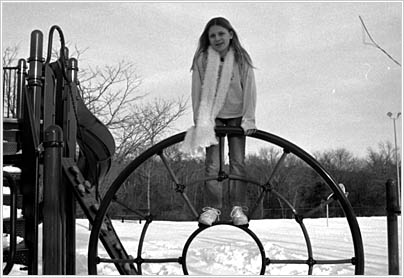 |
 | ||||

|
||||
"We'll be doing round offs and cartwheels," explains Athena, "we'll be screaming our lungs out, and everybody's like, so happy they have me on their team because, like, I have so much energy." Erin (last name withheld) is a 17-year-old rocker who lives in a Boston suburb. "With my music, people tell me that I should write happy stuff, but that just doesn't work for me," says Erin. "The stuff that comes out of my mind is just like, you know, all sorts of negativity." Fittingly, Erin's favorite color is black. She wears thick, dark eye-liner, tight jeans, and clunky silver pentacles around her neck. She's perfected a sarcastic stare, and when she wants to get away from her family, she writes songs in her basement studio. "This one already has a name," she says as she starts a song. "It's called 'Go to Hell.'" "This is Mr. Stick, he's like a stick figure," says Eric Rancke, a 16-year-old who likes to crack up his friends with his South Park-style cartoons. "In this one you see his building is burning, and then he runs by one person needing help, and then he runs by another person needing help. Until he gets to his room, and there's a beer sitting on a table, and he's like, 'Alright, it's still cold.'" Eric usually wears baggy clothes and a backwards baseball cap as he lounges around his western Massachusetts home. He has visions of becoming a late night comedian, like his hero Conan O'Brien. "Well, basically, one thing you should know," Eric explains, "I have no problem making a complete ass of myself." You could easily picture these three kids at a comedy club, rock concert, or half-time show. But for Eric, Erin, and Athena, growing up has not gone according to plan. Athena was kicked out of her after-school cheerleading program for getting into fights. Erin has threatened her mother with a knife and was arrested for public drunkenness. Eric cursed out his middle-school principal and still holds the record for detentions. All three have been diagnosed with bipolar disorder. "I think bipolar illness is hard for anyone at any age, but particularly if your brain hasn't developed, and hasn't been able to develop the kinds of friendships and relationships you need for support," says Dr. Kay Jamison, a professor of psychiatry at John's Hopkins University. In her book The Unquiet Mind, she writes about her own experiences with manic depression, which took hold when she was a teenager. "You're at a time of life when everyone around you seems to be healthy," says Jamison, "and all of a sudden, you have an illness that affects your thinking, your energy, your ability to walk, talk, do all of the things that make you a human being. And so it's just a level of pain and suffering that I think is unimaginable unless you've actually been there." "Just, there'd be times that I'd feel dead," says Erin, "or there'd be times when I'd feel on top of the world, but I wondered why I was so different from the other kids? Why I couldn't make friends, why I was the unpopular one, why I had decided to make myself dress different, listen to different music, why all this stuff was the way it was?" But when does being different qualify as being mentally ill? "We look for evidence that their moods have a negative impact on their ability to function in life. And that's very different, I think, than being a moody teenager," says Dr. David Miklowitz, a professor of psychiatry at the University of Colorado and author of The Bipolar Survival Guide. "For instance," says Miklowitz, "it's not unusual for young kids to pretend to be superheroes when they play together. At what point does that become a grandiose delusion? When the kid gets up on the roof and tries to jump off because they think they can fly." But it's not always so clear cut. And in the cases of Eric, Athena, and Erin, the early signs only became clear in hindsight. |
||||
Continue to part 2 |
||||
